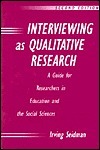What do you think?
Rate this book


Equally popular for individual and classroom use, the new Third Edition of Interviewing as Qualitative Research features:
* An introduction to the Institutional Review Board (IRB) process in its historical context, including an expanded discussion of informed consent and its complexities.
* Special attention to the rights of participants in interview research as those rights interact with ethical issues.
* Updated references and suggestions for additional reading for a deeper consideration of methodological, ethical, and philosophical issues, including relevant Internet resources.
143 pages, Paperback
First published May 1, 1991